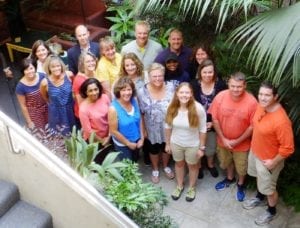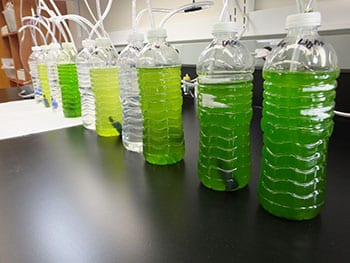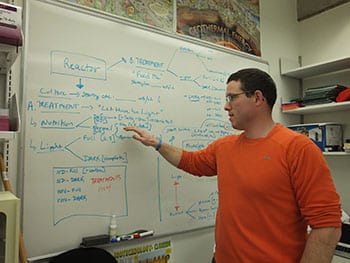News
Teach the Teachers: Algae to Biofuel
BTI’s Education and Outreach Program is busy year round, but especially so in summer, when high school and college-aged interns come to work at BTI for 8 and 10 week programs. BTI also ‘teaches the teachers’ in two different week-long summer workshops, to provide teachers with classroom and curriculum resources. Our current Teaching Laboratory Coordinator Shawn Kenaley joined BTI in January 2014 and manages our Bioenergy and Bioproducts Education Program (BBEP). The program — in collaboration with 7 other major institutions and universities, including Cornell — works with teachers to develop curriculum about biofuels. Tiffany Fleming also hosts the CDP: the Curriculum Development Workshop in Plant Biology, which is a one-week intensive professional development opportunity for 7-12th grade science teachers interested in enhancing their content knowledge and classroom curricula around recent advances in plant biology, science teaching and the National Science Education Standards.
The BBEP teacher development program works with high school and college teachers to increase their depth of knowledge on bioprodects and bioenergy. As worldwide energy demands increase and petrochemical fuel supplies dwindle, scientists are constantly looking to find more sustainable sources of energy. Making biodiesel and cellulosic ethanol from plants may divert agricultural acreage away from food production, so a need to explore other bioenergy options is key.
Fast-growing microalgae — photosynthetic protists — are a promising alternative source for biofuel production because they do not have to be grown on arable land. Microalgae can be quite efficient at converting sunlight into chemical energy. They produce fatty acids and/or essential oils that can be converted chemically to diesel fuel, kerosene, and /or gasoline. Research will refine the alga-to-biofuel pipeline for maximum efficiency and productivity.
The BBEP program has developed experiments that teachers can run in chemistry classrooms to show students how algae can be grown, and how experiments are designed to test the success of different inputs. By following a ‘systems’ approach students will learn how to think scientifically, while simultaneously learning about biofuels. The hope is that the teachers, and subsequently the students, will increase their understanding of the field, leading to broader public understanding of the science and maybe inspiring more researchers to enter the field.
For the BBEP program, Shawn provides teachers with a kit that contains everything they will need to run the experiments; background literature, lesson plans, experimental designs(s) and materials, and student handouts. He will also be conducting a one-day training workshops where teachers conduct an alga-to-biofuel experiment. He follows up with classroom visits through out the year to answer any teachers questions that may have developed while they were implemented the curriculum. Shawn will present at Science Education conferences to let educators know about the BBEP curriculum and how to implement it. This project is funded by the USDA NIFA, the United States Department of Agriculture National Institute of Food and Agriculture.
With a PhD in Plant Pathology and undergrad degree in Forestry, Shawn loves teaching science, “I believe the most exciting part of my job has been the time spent working in STEM-based classrooms; getting young students to understand the importance of science and technology in the research and development in the areas of natural resource management and renewable bioenergy is incredibly gratifying. Getting young students – our future scientists – engaged with the natural world that surrounds them is my primary goal. In so doing, I hope to sharpen, if not improve, student science literacy.”
For more information, please check out the Education section of the BTI web site, http://btiscience.org/education/ or email Dr. Shawn Kenaley directly at sck26@cornell.edu





